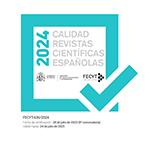La paradoja del tiempo como libertad
Resumen
Independently of the now classic acadernic considerations on the problen of time, and of subjectivity, this study builds on certain ideas from Rorty, Davidson, and Zizek in order te examine the question of the possibility of freeing the future from the past, as psychoanalysis, in its own way, seeks to do, and of freeing the past from the future, since, in a way, as the sought-after or expected result, this is the principiple that regulates the present. First, we consider aspects that may in the final analysis become pure strategies, such as the concept of "known past", and the problems raised by the attempted release from the past. We then analyse the disiliusionment that the present brings with it, and finaly address the problem of the future as an ambit of liberation, as offered by a promise and favoured by Une principle of "solidarity". The study presents a critique that aims te be radical, though it leads to a paradox: freeing the future from the past, and freeing the past from the future, may conspire against the search for emancipation. The conclusion set a pessimism against man's constant aspiration, the "passion for freedom".Descargas
Descarga artículo
Licencia
La revista Logos. Anales del Seminario de Metafísica, para fomentar el intercambio global del conocimiento, facilita el acceso sin restricciones a sus contenidos desde el momento de su publicación en la presente edición electrónica, y por eso es una revista de acceso abierto. Los originales publicados en esta revista son propiedad de la Universidad Complutense de Madrid y es obligatorio citar su procedencia en cualquier reproducción total o parcial. Todos los contenidos se distribuyen bajo una licencia de uso y distribución Creative Commons Reconocimiento 4.0 (CC BY 4.0). Esta circunstancia ha de hacerse constar expresamente de esta forma cuando sea necesario. Puede consultar la versión informativa y el texto legal de la licencia.











